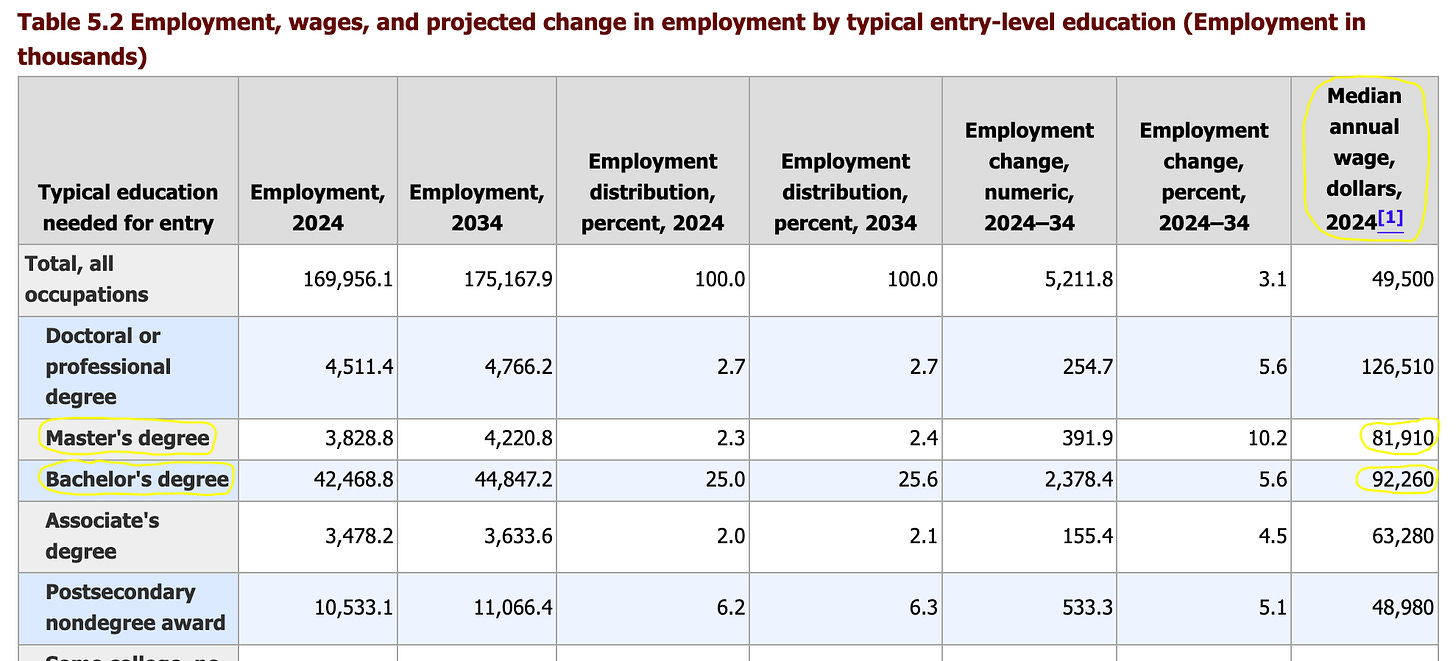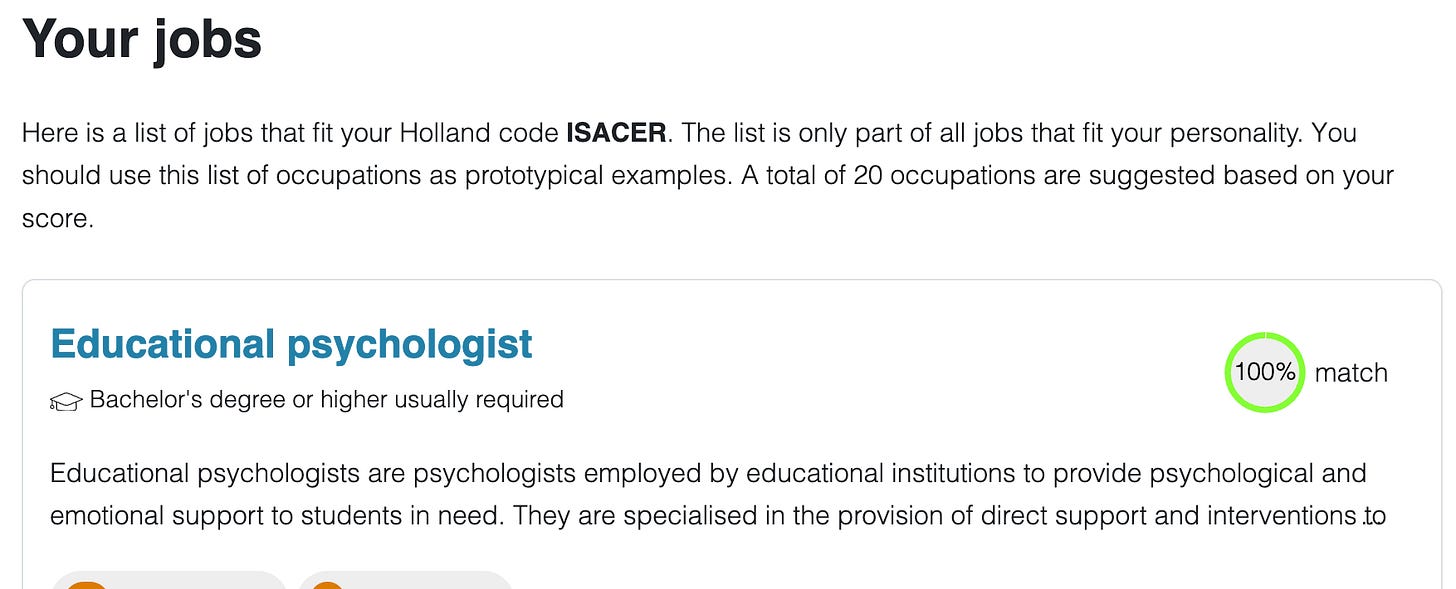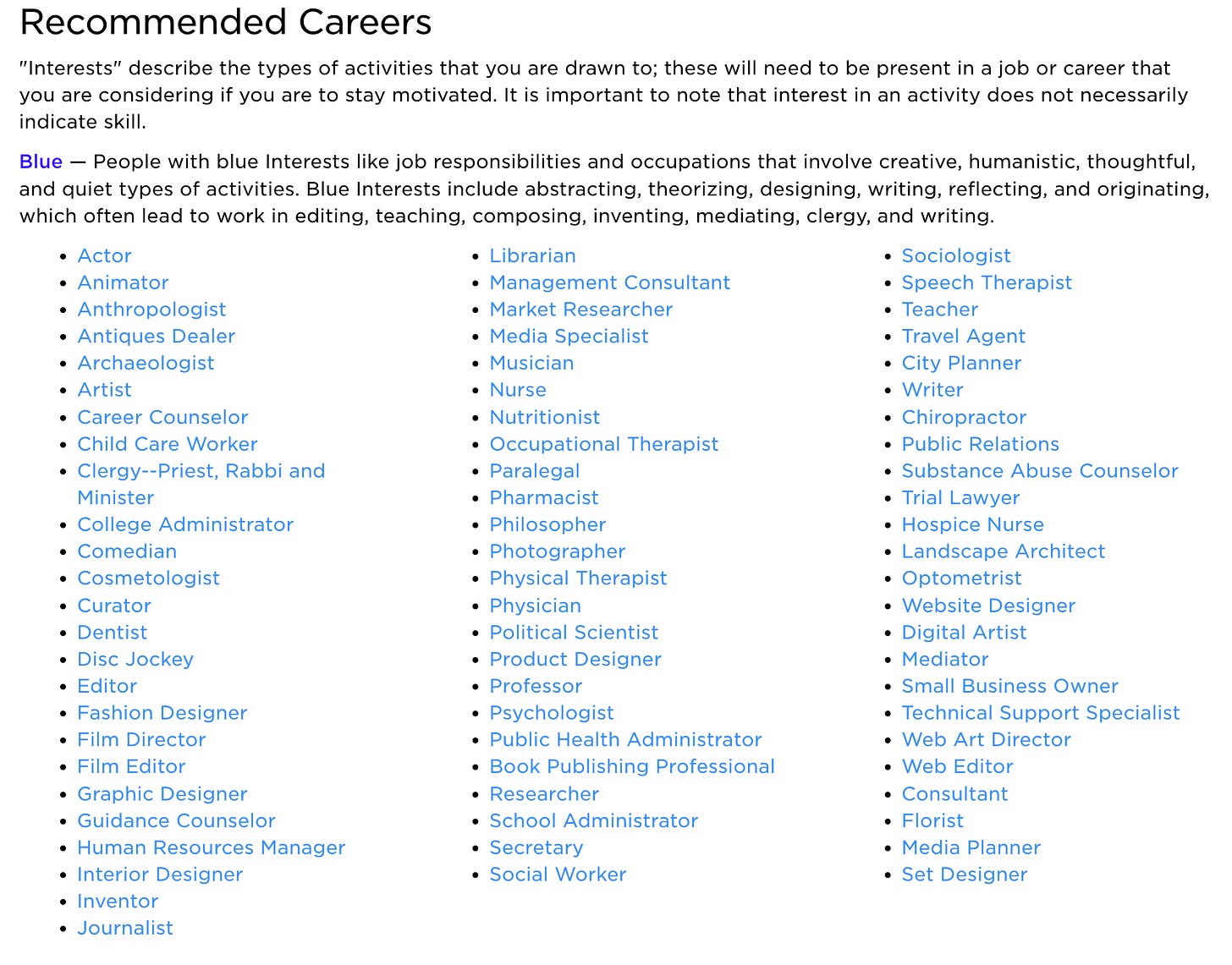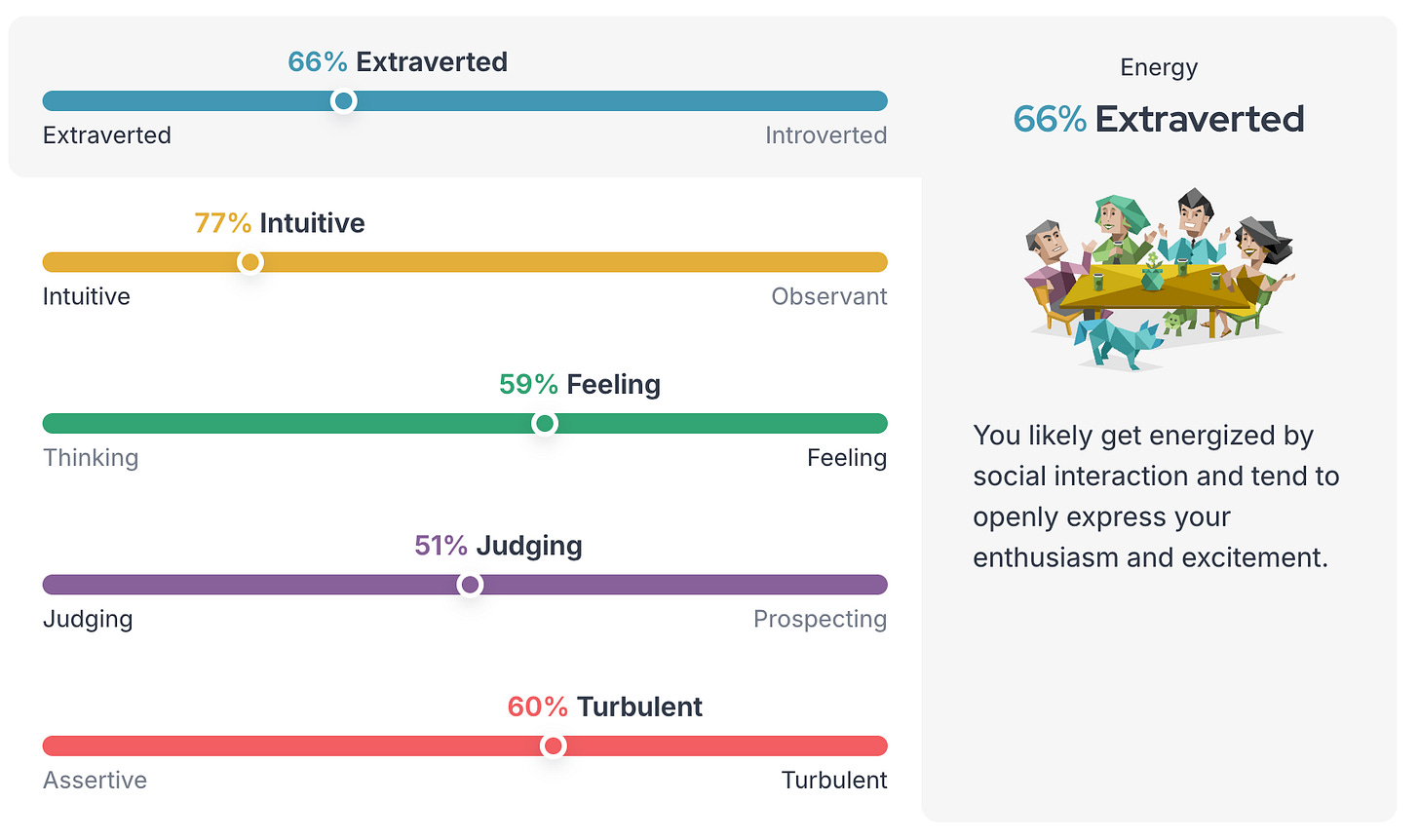Going back to school isn't the answer.
The payoff for grad school isn't what you think it is - here are 5 things you should consider doing instead.
I want to specify here - I’m mainly talking to people who have a Bachelor’s degree and are thinking of going back to school to obtain an advanced degree.
Please, please, PLEASE, think long and hard before deciding to go back to school.
As we’ve discussed before, we are in a very poor job market and there are more people unemployed than there are jobs available. People are discouraged, applying to 100s of jobs with no responses. It’s a tough situation with no signs of easing up any time soon.
I’ve talked with multiple people recently who, after receiving many rejections or feeling discontent with their current employment, are considering going back to school instead. We’ve been told from generations before us that higher education meant better job opportunities, job security, and higher salaries. With the present state of affairs though, we’re realizing that much of these hopes are now pipe dreams and many of these promises do not hold true present day.
The data does not promise higher earnings. The median salary for Master’s degree holders (the salary earned that is smack dab in the middle of earners with the degree, different than the average) is actually LOWER than the median salary for Bachelor’s degree holders. Highlighted in the table below from the Bureau of Labor Statistics (BLS), it shows that in 2024, for a Master’s degree the median salary was $81,910 while for a Bachelor’s it was $92,260. This takes into account jobs at all stages of a career, not just the starting wage for new or entry-level jobs.
The job market is not favoring degree holders. The market is oversaturated with degree holders, while many of the jobs available are not ones that require degrees. The sectors that are growing are mainly in the trades, not in traditional white-collar work. With more people going back to school, the jobs which do require degrees are getting more competitive. Additionally, 2025 hiring trends show employers favoring skills over education. They’re prioritizing jobseekers with good track records and demonstrative skills over diplomas.
Employers are hesitant to hire over-credentialed applicants who might desire a higher salary more than those with a Bachelor’s that are willing to accept the same role for lower.
The student loan debt bubble keeps growing, with university graduates struggling to keep up with loan payments. Federal student loan debt is hovering around ~$1.7 trillion, with default rates rising, even more than we saw leading up to the housing bubble of 2007.
The opportunity cost for time spent in school is expensive. Time taken away from earning and developing skills and experience is costing more now than ever. With employers valuing experience and skills, time spent out of the job market could further damage future career prospects.
I know it feels good to tell someone you’re enrolled in an advanced degree program rather than admit you feel stuck, but that dopamine hit will fade and reality will set in. There’s no guarantee the job market will be better in two years. Being a “professional student” becomes a cyclical trap difficult to escape.
Don’t keep digging your hole.
This advice especially goes if you currently have a job. The best thing people can do right now if they are employed is to stay employed. If you’re looking for a job, you might need to broaden your job search and accept a position not requiring a degree or even paying lower than you hoped. If you’ve had no luck applying, you may need to aim lower. Any job (gaining experience/staying employed) is better than no job. If you’ve recently graduated with a Bachelor’s and have had difficulty finding employment (like most college grads right now), more school will not help and should not be your fallback.
I know this is not what people want to hear, but I cannot in good faith sugarcoat what is going on. If you are seriously considering going back to school, let’s talk about five things you should consider first.
1. Upskill at your current employer
If you have a job now but know you don’t want to be in that position or industry forever, consider ways you can learn new skills in your current position to help leverage your next one.
At Nike, they encourage their employees to look for stretch opportunities, called “stretches.” While working in one department, they have opportunities to cross-train in others and learn new skills from people outside their current circle. If they excel in their stretch then they might even move them to that department.
If your company doesn’t offer direct opportunities like Nike does, you can ask your manager what types of projects you could help initiate. Or, you could suggest areas you see needing improvement and how you might address those (respectfully). Not every manager will be open to this, but if takes work off of their plate, then they might be all for it.
For example, maybe you run a program that could use some additional funding so you offer to write an application for a grant that would benefit your program. Boom = now you have grant writing experience. Caution: I did this once and got reprimanded by our official grant writing team. We did win the grant though and I still put it on my resume 😌.
Maybe you work for a small business that has no social media presence. Offer to create and manage the socials for the business. Boom = marketing and social media experience.
Look for the gaps. Think of solutions for the gaps. Implement the solutions. Manage the project. Measure the outcomes. Now you have experience in project management!
There are all sorts of opportunities to leverage your current position and build your skill set for your next venture.
Bonus Tip: If you are a valued employee with a drive to grow at your company, see if they’ll offer assistance to obtain an advanced degree. This is more common for MBAs but is definitely worth looking into before embarking on it alone.
2. Consider other avenues to learn/develop new skills
Furthering your education doesn’t have to look like going back to university for an advanced degree. There are free/economical resources out there to look into for areas spanning trades, tech, project management, finance, and more. Here are some resources to look into:
Your local community college is also a great resource for certificate programs and specific skill development.
3. Volunteer
If you’re struggling to find a job in your industry of choice or are having trouble branching into a new one, look for opportunities to volunteer your time and skills.
Volunteering can offer multiple avenues for advancement and upskilling. It will help you build rapport, practice implementing your skills, build your resume, and most importantly, create connections in those industries. This can be especially valuable if you took the first job you could find in order to sustain yourself until you find a more desirable role.
It is also a great way to see if you’re interested in a particular industry before diving into an advanced degree program for it. Volunteering may seem time-intensive, exploitive, or impractical, but so would obtaining a degree while accruing $40k+ in debt and then figuring out you’re not passionate about the work.
4. Connect with people
I use the term “connect” rather than “network” because tone is everything, and connecting with people can be for reasons beyond just landing another job.
Connect with people who have gone through a program that you’re considering. Reach out and ask if they can chat for 15 minutes. Ask them what they thought of their program and whether they would recommend it. There will likely be bias in their answer, especially if you’re talking to someone particularly successful, so you’ll need to weigh what they say.
In particular, ask them what they learned and how they landed their next job.
These question are important because many people land jobs through personal connections. Additionally, many people build on their current experience in an industry and an advanced degree is the icing on the cake. If you want to dive into grad school straight from undergrad, you won’t have the same experience they may have had that made landing that next job easier. Consider all the factors involved, but talking to people will help broaden your understanding of the program and its benefits.
Networking is critical to growing in your career, and this article “How to network without actually networking” offers great low-effort ways to get started.
5. Reflect on where you really want to be
Why do you really want to go back to school?
If it’s just to further your job prospects or for the bragging rights, then you might need to reach a little deeper. Higher education isn’t showing much of a payoff at the moment, especially in industries that employers slowing hiring.
Ask yourself what it is you truly want to do. Where and who you would want to be after obtaining a degree.
Some fields of work will definitely require grad school, such as engineering or certain healthcare professions, and if you want to be in a role like that then higher education may be the next step.
But if you’re throwing a dart at the map and going with it, you need to learn more about yourself and figure out what you want.
But Grace, how do I figure out what I want??
So glad you asked, here’s where I would start:
Take some personality/career quizzes!
Here are some recs for free quizzes to take:
Career Focused Quizzes:
123 Career Test - quick and gives the 20 top careers that would be a good fit for you.
I was a 100% match for Educational Psychologist, which doesn’t seem too different than what I do now.
Career Explorer - takes about 30 minutes and provides a thorough analysis.
Princeton Review Career Quiz - gives lots of suggestions on potential career paths to consider.
Here were my lengthy results:
Personality Focused Quizzes:
16 Personalities Test - only takes 10 minutes and I found to be particularly insightful and accurate.
Little spooky how accurate this was actually.
123 Personality Test - quick and insightful, but the results are harder to interpret.
Enneagram Test - some people think the enneagram is cultish lol, and quizzes aren’t the best way to determine your type (I prefer the book The Road Back to You), but it is insightful in figuring out how you’re motivated. Further research will suggest career paths for your type. Mine suggested coach!
I encourage you to not hold on too tightly to the results of personality/career quizzes, as they can’t truly know YOU, but they can offer insights about yourself and your strengths that you may have overlooked. I’m not saying these quizzes will tell you exactly what you want, but they can be tools to help you figure that out for yourself.
Conclusion
If you have a clear direction for where you want to end up, and the path to get there requires a graduate degree, then go for it. Even in a difficult job market, pursuing your dream career is important. If you want to make it work and are willing to put in the work to get there, it will happen.
But let me make this clear:
If you feel lost and directionless, going back to school is not the answer.









From someone who left her very stable (and promising) career, just for a "temporary dopamine" of graduate school, I can't agree more! It was fun at first, then 2 years passed and you would try to convince yourself that it was worth it. Thanks God, for me, it is worth it. I got a better job after getting my Master. However, not everyone are lucky. Some of my friends are stuck in the cycle, and either end-up jobless, or got their PhD because that's the only thing they know.